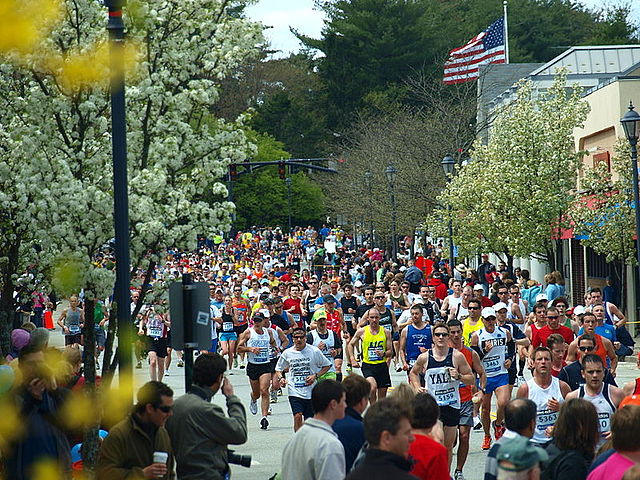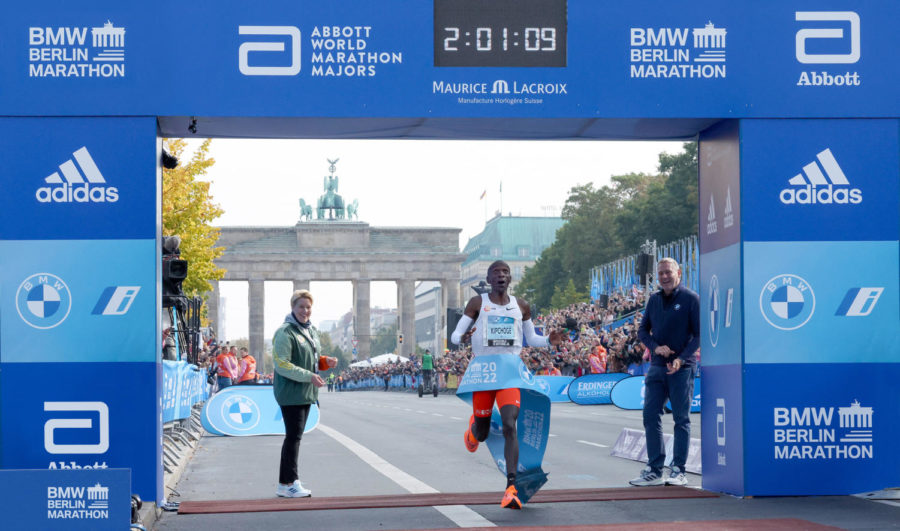The 2023 Boston Marathon: An Overview
What happened during the 2023 Boston Marathon?
Anonymous Unknown author, CC BY-SA 3.0
A crowd of runners pushes forward as people watch from the sidelines during the 2010 Boston Marathon.
In anticipation of the oldest annual footrace, thousands of participants gathered from across the globe in Boston, Massachusetts, where they ran this year’s full 26.2-mile (or 42.2 kilometers) race. During this year’s Boston Marathon, participants put forth the entirety of their mental and physical strength, the culmination of their months-long training, to reach the finish line.
The very first Boston Marathon took place in 1897, albeit with few participants. However, the marathon would gradually grow in both size and fame throughout the decades, receiving recognition and acclaim as more runners joined in and running times were being cut down by the seconds.
As of 2023, this year’s race marks the 127th Boston Marathon. The competition, held on Monday, April 17th, 2023, held various divisions planned to run at different times of the day, including the pro-athlete and pro para-athletes classes for both male and female groups. The race route began in Hopkinton, Massachusetts, and extended continuously northeast to Boylston Street in Boston, Massachusetts, where the finish line — the end goal — was set.
Tens of thousands of participants lined up at the starting line and ran toward the finish, with an even greater number of spectators — numbers reaching up to half a million — watching them from the sidelines. In this compacted race, each and every competitor was out to achieve personal bests and invaluable experiences, but a group of elite competitors held the spotlight for this event.

Making Predictions
Standing at the top of the professional field for the men’s open division was Kenyan runner Eliud Kipchoge, the 38-year-old world record holder in the marathon distance and two-time Olympic gold medalist. Kipchoge was the favorite entering this race and was highly expected to win, given his superior racing history and achievements.
Since 2003, he has been competing at the world level and won a total of 14 gold medals, 12 of which are from major marathon races. In his most recent first-place win in the 2022 Berlin Marathon, Kipchoge set a new marathon record with a time of 2:01:09, beating the previous record of 2:01:39 that he set himself back in the 2018 Berlin Marathon four years ago. The sheer number of gold medals and the records he has set are a testament to Kipchoge’s dominance in the marathon scene.
Despite being the current marathon record holder and a runner of a superb caliber, Kipchoge was still expected to make efforts to secure a win in this upcoming Boston Marathon. After all, there were a total of 8 runners who had run under 2:05:00 participating in the race. Of those eight were Evans Chebet from Kenya and Gabriel Geay from Tanzania, each having the potential to steal the spotlight from Kipchoge.
Evans Chebet is a seasoned runner, having competed in marathons and producing top-class times as early as 2013, his best time recorded as 2:03:00. In recent years, Chebet has been making noticeable strides in his racing performance as he won gold in a total of five marathons, including the 2022 New York Marathon and the 2022 Boston Marathon, making him the current defending Boston Marathon champion. With so much marathon racing experience under his belt, Chebet was expected to put on an interesting show in this race. “Evans Chebet is a real threat and is on a roll after his victory in the New York City Marathon,” said avid runner and member of the Bronx Science Boys’ Varsity Track team Nicholas Anderson ’25.
Similar to Chebet, Geay showed the potential to challenge Kipchoge. He currently holds the Tanzanian national record and a personal record of 2:03:00, which he set at the Valencia Marathon in Spain last year, and a half-marathon best of 59:42. Geay has also shown immense improvement as he cut down his marathon time by more than four minutes, from 2:07:31 in July 2022 to 2:03:00 in December 2022.
With such a talented field participating in this marathon, there stood a possibility for records to be set.
Back on October 12th, 2019, Kipchoge was the star athlete in the INEOS 1:59 Challenge, a task that sought to break the two-hour barrier that was long believed to be unachievable. In Vienna, Austria, with the weather, the route, and the pacemaking all methodically planned out, Kipchoge ran an unofficial world-breaking time of 1:59.40, fulfilling INEOS’s mantra #NOHUMANISLIMITED. Since then, he remains the only one to have accomplished this feat.
Given this feat, along with his many other accomplishments, there were speculations that Kipchoge would beat the course record of 2:03:02, set in 2011 by Geoffrey Mutai, Kenyan four-time gold medalist in the Boston, New York City, and Berlin marathon majors.
However, Boston is known for its hilly terrain. “I don’t think he [Kipchoge] will break any records though. Boston is a notoriously tough race,” said Anderson. The Boston Marathon starts at a max elevation of 470 feet (or 143 meters) and gradually descends into a seemingly flat route for the first 15 miles. However, upon approaching the 16th mile, there emerges more frequent sharp shifts in elevation and upward slopes. Overall, the runners were to experience an elevation gain of 815 feet (or 248 meters), a task expected to significantly slow down already physically-pressured runners. “The times will definitely be slower. It should make for an interesting race,” said Anderson.
But does Kipchoge have what it takes to set a new world record once again? Well, not so. No one would officially set a new record given that the Boston course does not meet certain requirements. Set by the World Athletics in 1990, a world record would not count since the course is a “point-to-point” marathon — unlike other marathons which travel in loops — and has an unusual, dramatic change in elevation.
How It Played Out
Many anticipated Kipchoge to win, while others hoped for a different outcome. But how did the race actually play out?
Taking first place, Evans Chebet crossed the finish line with a time of 2:05:54, successfully defending his title as the Boston Marathon champion. Gabriel Gaey came trailing just 10 seconds after Chebet to secure a second place finish, clocking in at a time of 2:06:04.
Kipchoge, on the other hand, finished an unexpected sixth place with a time of 2:09:23, appearing slower and weaker than usual. During the first half of the race, he comfortably stayed in the lead pack, as he had always done in many of his races. However, in the latter half, he began to show signs of vulnerability and weakness as he dropped from the lead group. Gradually, his pace declined and his splits increased, ultimately finishing the race at a pace of 5:24 minutes per mile, which is substantially slower than his usual marathon pace. But what exactly caused this performance?
The 2023 Boston Marathon was Kipchoge’s first time running the Boston course, so a lack of familiarity with the terrain may have played a difference. Another possibility could be that, midway through the race, Kipchoge missed his water station and had to keep running to stay with the lead pack. He most likely faced physiological strain because of the lack of necessary nutrition, and had to slow down as a result.
In a post race interview, Kipchoge revealed that he actually had discomfort in his left hamstring, and that he struggled to lift the leg up. Despite his setbacks, Kipchoge still pulled through the entire race, setting himself an inspirational finish.
What Now?
With this Boston Marathon win, Evans Chebet has made a name for himself in the running community. Chebet, in the foreseeable future, will continue to take huge strides and perhaps accomplish new records and personal bests, should he stay consistent and healthy.
In the same vein, Gabriel Gaey can build up on his second place finish with potential future achievements and produce stunning, exhilarating races such as this year’s Boston Marathon.
As for Kipchoge, he will most likely focus on maintaining his health and take cautious measures in his training. Should he decide to participate in other future marathons, Kipchoge can possibly showcase his true potential without any issues as what happened in this race. Perhaps he can participate in next year’s Boston Marathon and take first to accumulate 5 out of 6 major marathon victories — he will be a step closer to accomplishing his goal of winning all 6 major marathons and making history.
But only time will tell, and until then, the running community will continue to evolve and surprise us in the most unpredictable ways.
In anticipation of the oldest annual footrace, thousands of participants gathered from across the globe in Boston, Massachusetts, where they ran this year’s full 26.2-mile (or 42.2 kilometers) race. During this year’s Boston Marathon, participants put forth the entirety of their mental and physical strength, the culmination of their months-long training, to reach the finish line.
Joshua Im is a Features Section Editor for ‘The Science Survey.’ He appreciates journalistic writing and sees it as a wondrous combination of creativity...


